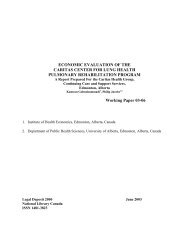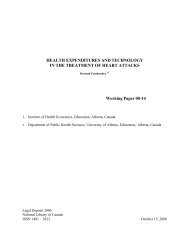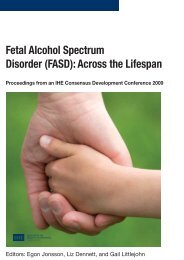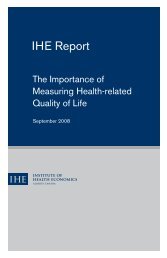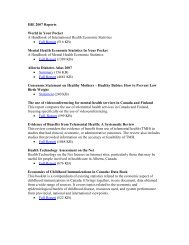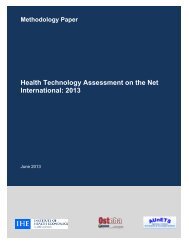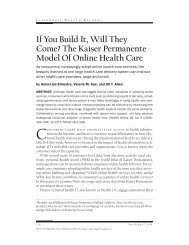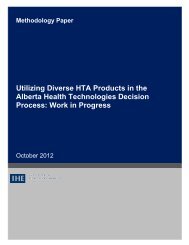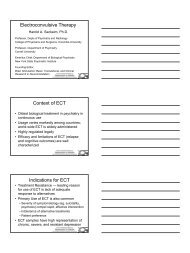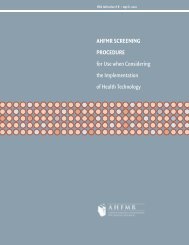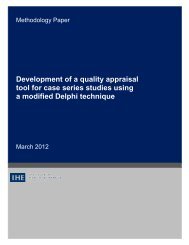Bariatric treatments for adult obesity - Institute of Health Economics
Bariatric treatments for adult obesity - Institute of Health Economics
Bariatric treatments for adult obesity - Institute of Health Economics
- No tags were found...
Create successful ePaper yourself
Turn your PDF publications into a flip-book with our unique Google optimized e-Paper software.
Table T.8: HrQoL measures used in the 34 RCTs 65Generic HrQoL measures Obesity-specific measures Non-<strong>obesity</strong>-specific measuresSF-36 Binge Eating Scale Beck Depression InventoryVisual Analog Scale Eating Disorder Inventory State-Trait Anxiety InventoryGeneral Well-being Scale Three Factor Eating Questionnaire Rosenberg Self-Esteem ScaleGeneral <strong>Health</strong> Rating Index Impact <strong>of</strong> Weight on QoL Perceived Stress ScaleSickness Impact Pr<strong>of</strong>ile Scale <strong>of</strong> Obesity Problems Pr<strong>of</strong>ile <strong>of</strong> Mood StatesAbbreviations: HrQoL = health-related quality <strong>of</strong> life; QoL = quality <strong>of</strong> life; RCTs = randomized controlled trials; SF = short <strong>for</strong>mThis review assessed methodological quality <strong>of</strong> the included RCTs. Concealment <strong>of</strong> randomizationwas explicitly stated in only four RCTs. Twenty RCTs did not indicate whether or not theinvestigation team was blinded to the treatment arm. Twenty-two RCTs reported lost to follow-up,with the most common reason <strong>for</strong> loss to follow-up being patient dropout. Overall, an average <strong>of</strong>21% <strong>of</strong> the original sample was lost to follow-up and a higher percentage was lost in the controlgroup (23%, with a range from 0% to 65%) than in the intervention group (19%, with a range from0% to 41%).Thirty-three RCTs conducted intention-to-treat analyses. In 13 RCTs, multivariate analyses <strong>of</strong>HrQoL outcomes were conducted, but only three RCTs reported results, both controlled anduncontrolled, <strong>for</strong> weight change in the analysis <strong>of</strong> HrQoL.Another methodological issue is that many <strong>of</strong> the RCTs lack statistical adjustments <strong>for</strong> multiplecomparisons. Although HrQoL was only one <strong>of</strong> several outcomes measured in these trials, onlyeight RCTs controlled <strong>for</strong> multiple comparisons in the HrQoL analyses.The studies showed that weight-loss <strong>treatments</strong> appeared to affect HrQoL among differentdimensions, and that these effects varied over time. Treatment effects on HrQoL, as measured bygeneric measures, were positive <strong>for</strong> at least one domain in every time period, but the domain variedacross studies. HrQoL assessed by generic measures was not consistently improved; only 9 <strong>of</strong> 34RCTs showed QoL improvements in one or more domains. For the two types <strong>of</strong> condition-specificmeasures, results were inconsistent <strong>for</strong> all measures except <strong>for</strong> the <strong>obesity</strong>-specific scale <strong>of</strong> <strong>obesity</strong>problems. Of the 11 RCTs that included <strong>obesity</strong>-specific measures, six RCTs showed positivetreatment effects; however, only two <strong>of</strong> the 15 RCTs that used non-<strong>obesity</strong>-specific measuresshowed positive treatment effects. A meta-analysis <strong>of</strong> eight RCTs that used the Beck DepressionInventory did not find significant improvement in depressive symptoms in the intervention group ascompared to the control group.The CADTH report 38 also examined the effect <strong>of</strong> bariatric surgeries on HrQoL. One trial <strong>of</strong> 197patients used a generic instrument—the Medical Outcomes Study 36-Item Short Form (SF-36), tomeasure HrQoL. At one-year follow-up, no significant differences across all eight domains werefound between AGB and RYGB. Another trial used SF-36 to measure HrQoL in patients treatedwith laparoscopic surgery or open surgery. Compared to open surgery, laparoscopic surgery receivedsignificantly better scores in three <strong>of</strong> the eight domains (that is, in physical functioning, socialfunctioning, and mental health).Two trials with 160 patients measured HrQoL using an <strong>obesity</strong>-specific measure—theGastrointestinal Quality-<strong>of</strong>-Life Index. One trial found a significantly better QoL in the RYGB<strong>Bariatric</strong> <strong>treatments</strong> <strong>for</strong> <strong>adult</strong> <strong>obesity</strong> 87



